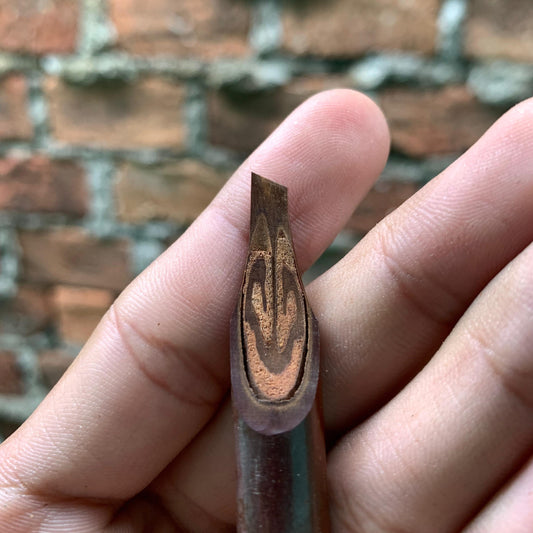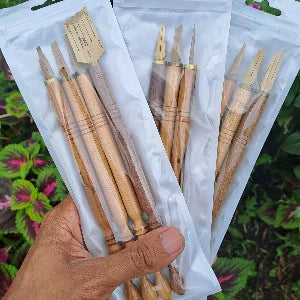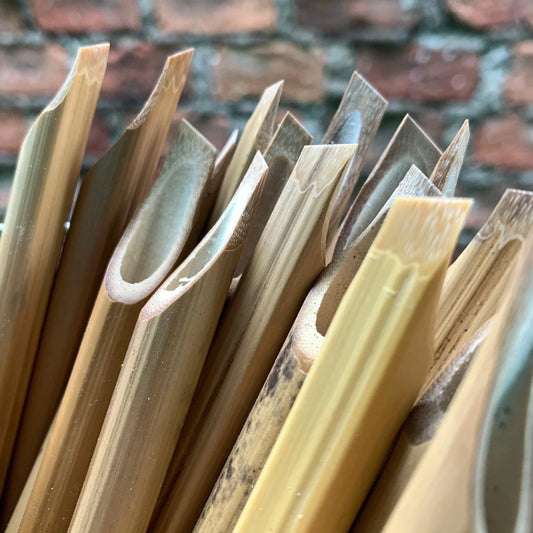Maintaining Arabic Calligraphy Pens: Cleaning, Sharpening & Storage
Sodiki AbdullahShare
Whether you use a qalam, a reed pen, or a metal nib, your tools are more than writing instrument, they are extensions of your artistic expression. Proper maintenance keeps your strokes sharp, ink flow consistent, and your tool performing beautifully for years.
IIn this guide, we'll cover the best methods to clean, sharpen, and store your Arabic calligraphy pens so they stay precise and long-lasting.
Why Proper Maintenance Matters
A well-maintained pen defines the quality of your calligraphy. Dried ink, dull nibs, or warped reedscan quickly ruin your work, causing uneven lines or blotched ink flow.
Calligraphy tools, especially bamboo or reed pens, are sensitive to moisture, temprature, and ink residue. Taking a few minutes after each session to care for them prevents irreversible damage and saves you from constantly replacing your tools.
Cleaning Your Qalam & Metal Nibs (Step-by-Step)
Cleaning is the foundation of good maintenance. Ink residue hardens quickly and can permanently clog or crack your nib if ignored.
Here's a simple and effective routine:
1. Wipe after every use
Use a soft tissue or lint-free cloth to gently remove any ink remaining on the nib.
2. Rinse metal nibs with warm water
Hold the nib under running warm (not hot) water. For oil-based inks, use a drop of mild dish soap to dissolve any buildup
3. Clean reed or bamboo qalam carefully
If the ink has dried on the tip, soak only the nib portion (1-2 minutes) in warm water. Wipe dry and reshape the tip gently if needed.
4. Avoid over-soaking.
Never immerse the entire bamboo shaft, excessive moisture can cause splitting and deformity over time.
5. Dry vertically.
Stand the pen upright (nib down) so excess water drains without seeping into the shaft. Allow complete air drying before use or storage.
Pro Tip:
For stubborn ink stains, use a soft toothbrush or cotton swab to clean fine grooves on metal nibs. Never scrape with sharp tools.
Sharpening & Re-cutting Your Qalam
A sharp and well-shaped nib ensures clean, elegant strokes. Overtime, reed or bamboo tips wear doen and need reshaping
Follow these steps:
1. Start with a sharp knife
Trim the end of the qalam at a slight angle according to your preferred script style (Thuluth, Naskh, Diwani, etc).
2. Smooth the edge
Use fine-grit sandpaper or a metal file to polish the cut. This eliminates tiny fibers that might catch ink unevenly.
3. Check nib width.
Use a paper guide, 3-5 mm for most scripts to ensure accuracy. Consistency in nib width equals consistency in line flow.
4. Replace when Necessary
If the nib tip cracks or the ink flow feels unstable, it's better to replace than force it. A damaged qalam can ruin your lettering rhythm.
Tip for perfectionists:
Test your sharpened nib on scrap papaer before serious work. The line should start crisp and finish clean without feathering.
Storage & Long-Term Protection
How you store your pens directly affects their lifespan and performance. A dry, balanced environment prevents warping and rust.
Here's what to do:
1. Store reed or bamboo pens horizontally.
This prevents bending or uneven drying. Keep them in a ventilated box or on a flat pen rest.
2. Keep metal nibs dry
After cleaning, store in a sealed container with silica gel or moisture-absorbing packets
3. Avoid temprature extremes
Humidity causes mold and warping, while excessive heat can dry bamboo fibers and make them brittle.
4. Inspect Regularly
Especially if you live in a humid climate. Check your tools weekly to ensure they remain dry and intact.
Extra care tip:
You can lightly oil the bamboo shaft every few months using natural wood oil to maintain flexibility and prevent cracking.
Final Thoughts
Your calligraphy tools reflevt your discipline as much as your artistry. By investing time in proper care, your qalam or nib becomes a lifelong companion. Producing elegant strokes and smooth ink flow every time.
At Finlan Project, we believe every artist deserves tools that inspire. Explore our handcrafted Arabic calligraphy pens, nibs, and accessories. Made for those who value both beauty and precision.











